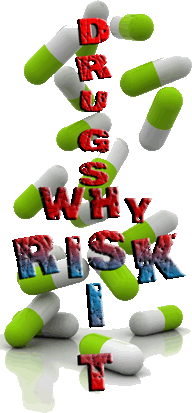Five major drugs and their effects on you
Cannabis
 As in previous years, cannabis was the drug most likely to be used in England and Wales. The survey found that 6.6% of 16 to 59 year olds (or about 2.2 million people) reported using cannabis in the last year.
As in previous years, cannabis was the drug most likely to be used in England and Wales. The survey found that 6.6% of 16 to 59 year olds (or about 2.2 million people) reported using cannabis in the last year.
Cannabis can cause anxiety, paranoia and loss of motivation. There's evidence that cannabis use increases the risk of developing a psychotic illness, such as schizophrenia, and can cause a relapse in those with a pre-existing condition. Cannabis, like tobacco, can cause lung disease. Long-term or heavy use may cause cancer.
Powder Cocaine
Powder cocaine is the second most commonly used drug, with 2.4% of 16 to 59 year olds saying they had taken powder cocaine in the last year.
Cocaine, or coke, is highly addictive. People who are young and healthy can have a fit or heart attack after taking too much coke. It can also cause panic attacks.
Ecstasy
The survey revealed that 1.6% of 16 to 59 year olds had taken ecstasy in the last year.
Ecstasy can cause panic attacks or psychotic states. There have been more than 200 ecstasy-related deaths in the UK since 1996. The drug has been linked to liver, kidney and heart problems.
Amyl nitrite and amphetamine
Levels of amyl nitrite (also called poppers) and amphetamine use were similar (1.1% and 1%, respectively). Poppers aren’t addictive, but they can make you feel sick, faint or weak and give you an extreme headache. Some men have trouble getting an erection after sniffing poppers.
Amphetamines are very addictive, and the comedown can make you feel depressed. They put a strain on your heart, and users have died from overdosing.
Hallucinogens and Ketamine
The survey found that 0.5% of 16 to 59 year olds had used hallucinogens (LSD and magic mushrooms). Use of ketamine was also estimated at 0.5%. The side effects of hallucinogens, which are random and occasionally very frightening, may include flashbacks.
Ketamine can cause panic attacks and depression. High doses can dangerously suppress breathing and heart function, and can lead to unconsciousness
